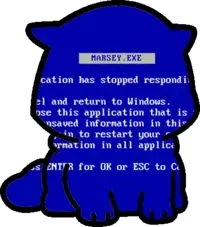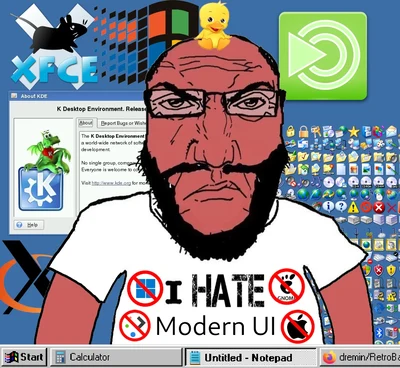Last time on the OS Wars: we covered a brief overview of Unix and the Windows NT kernel and a strange document known as the UNIX haters handbook.
In the modern age its common for people to decry the anti-consumer practices of big tech and long for the old internet. Well let me say tech companies have always been corrupt pieces of shit even before the advent of the internet. Case in point Microsoft who has a list of anti trust suites so long I have to break it up into multiple posts, and IBM who taught Microsoft many of these practices ("I learned it from you dad  "). In fact IBM was so evil back in the day Apple made a name for itself by just being not IBM. Thats what the famous 1984 Macintosh is about. It is Apple saying "IBM and its clone licensee program are a hair's bredth away from monopolizing the industry and doing god knows what and only Apple can stop them by providing competition".
"). In fact IBM was so evil back in the day Apple made a name for itself by just being not IBM. Thats what the famous 1984 Macintosh is about. It is Apple saying "IBM and its clone licensee program are a hair's bredth away from monopolizing the industry and doing god knows what and only Apple can stop them by providing competition".
Some of Microsoft's most infamous general mafia tactics include threatening OEMs who offered other OS's on their computer or tried to ship duel boot  . Vaporware: whenever a competitor had a shiny new innovative project you claim you are working on your even better version of that concept which is almost out even if it has barely entered development (most notably done during the making of Windows 1.01 to try and remove the steam from other DOS based GUIs like GEM, Top Veiw, and Vision).
. Vaporware: whenever a competitor had a shiny new innovative project you claim you are working on your even better version of that concept which is almost out even if it has barely entered development (most notably done during the making of Windows 1.01 to try and remove the steam from other DOS based GUIs like GEM, Top Veiw, and Vision).
FUD (yeah this doesnt just come from crypto) where Microsoft would spead Fear, uncertainty, and doubt about competitors projects working on their software such as the AARD code debacle where Windows 3.1 would throw random, nonsesical error messages if any DOS version (most notably DR-DOS) other then MS-DOS or PC-DOS was used even though the user could simply exit the error messages and everything would work as normal.
Embrace, Extend, Extinguish: a three step process where microsoft embraces an open standard, they then add a bunch of proprietary features on top of said standard which make it incompatible with the open standard, and then let your improved standard become the new standard and since it is proprietary everyone is forced into your ecosystem. Basically it is a roach motel easy to enter and hard to leave. Examples of this include word, internet explorer, and java++. Of these the office suite was the most successful, and Github is shaping up to be the next major EEE event.
In 1987Andrew S. Tanenbaum a computer science professor created the UNIX like micro-kernel known as Minix which was intended as a companion to his textbook Operating Systems: Design and Implementation to give students a toy OS to learn from. In 1983 Richard Stallman formed the GNU foundation, a group which seeks to free the computing world via the GPL license which was created in response to the UNIX wars, a subset of the OS wars cause the unclear licensing and copyright of the UNIX operating system, and the increasingly closed source nature of programs. In 1989 Lynne and William Jolitz began work on the 386BSD, an OS based on the Berkley Standard Distribution of UNIX, which was set to be the first open source OS inspired by the GNU foundation had BSD not gotten into a length legal battle with UNIX System Laboratories at AT&T. In 1990 Finn Linus Torvalds was taking a UNIX course at University of Helsinki which had Operating Systems: Design and Implementation and Minix as required reading. He wanted to play with Minix but was frustrated with its restrictive licensing so he created his own Unix like Kernal known as Linux. As Linux became licensed under GPL it began being worked on by the GNU foundation who replaced many of the Minix like aspects of it to make it more in line with UNIX. Releasing in 1991 Linux became the first free and open source operating system as 386BSD ended up releasing in 1992. Throughout the mid 90s as UNIX languished under the UNIX wars and Windows was looking to win the OS wars many institutions and corporations began to switch to Linux to avoid the monopoly of Windows.
This growth especially in the server market began to concern Microsoft who began holding internal disscussions and memos on how to best deal with Linux and free software. These documents became known as the Halloween Documents as they were published by FOSS advocate Eric S. Raymond which consist of leaked internal memos and emails, and official Microsoft press statements on Linux and FOSS software. In these documents Microsoft shares their fears of Linux whose free and UNIX like nature made it more attractive for previously UNIX based servers to switch to over Windows NT. They explicitly state that FOSS software is too useful to just be FU'd awayMicrosoft also feared that competitors like IBM or Sun would used Linux to reduce dependency on Microsoft and that OEMs like Dell could begin offering Linux based machines in order to crib better licensing deals on Windows. Microsoft also notes that Linux's FOSS nature allows it to receive bug fixes at a faster rate the Windows giving them a leg up on Window's "third times the charm" release strategy where Microsoft ships a buggy and shitty product which users beta test into a better one.
Microsoft pointed out two main avenues for attacking Linux. One, by attacking UNIX using EEE via their UNIX subsystem for Windows NT add on. Two, to find some way to use copyright and patent law against Linux and GPL.
https://www.gnu.org/software/fsfe/projects/ms-vs-eu/halloween1.html
Consequently, OSS poses a direct, short-term revenue and platform threat to Microsoft -- particularly in server space. Additionally, the intrinsic parallelism and free idea exchange in OSS has benefits that are not replicable with our current licensing model and therefore present a long term developer mindshare threat. [...]
Loosely applied to the vernacular of the software industry, a product/process is long-term credible if FUD tactics can not be used to combat it. OSS is Long-Term Credible. OSS systems are considered credible because the source code is available from potentially millions of places and individuals. [...]
Beating Linux [...]Fold extended functionality into commodity protocols / services and create new protocols. Linux's homebase is currently commodity network and server infrastructure. By folding extended functionality (e.g. Storage+ in file systems, DAV/POD for networking) into today's commodity services, we raise the bar & change the rules of the game.
https://www.gnu.org/software/fsfe/projects/ms-vs-eu/halloween2.html
PC OEM's. Other worst case adoption scenarios are subsets of the Sun / IBM case and involve other PC vendors such as Compaq and Dell. Note, however, that Compaq and Dell merely have to credibly threaten Linux adoption in order to push for lower OEM OS pricing. [...]
Beat UNIX. The single biggest contributor to Linux's success is the general viability of the UNIX market. Systematically attacking UNIX in general helps attack Linux in particular. Some Linux-targeted initiatives in this space (not a comprehensive list) include: UNIX services for NT Add-on pack [...]
The Linux community is very willing to copy features from other OS's if it will serve their needs. Consequently, there is the very real long term threat that as MS expends the development dollars to create a bevy of new features in NT, Linux will simply cherry pick the best features an incorporate them into their codebase. The effect of patents and copyright in combatting Linux remains to be investigated.
After this leak Microsoft released a press release explaining that the leaks were real but did not express the actual opinion of Redound as a whole and was simply a routine analysis of competitors with no ill will or malice towards linux:
On the Memo:
It appears to be a document written within Microsoft in August, with some annotation by others. It is routine and appropriate for Microsoft - and we would assume all other vendors - to research, write about, and assess all competitors ... both from a business model point of view and from a technical point of view. It is not an "official position" by Microsoft on Linux. It is a technical analysis written by an engineer in a staff capacity, and designed to encourage discussion.
On Linux:
Sometimes Linux competes with Windows NT. This is hardly news. But it is not NT vs Linux. Dramatically demonstrates the wildly different business models of the OS marketplace and the vigorous competition at every level (technical, alliances, applications, channels and business model) that characterize the industry. In addition, however, Linux is an alternative to/competitor for other versions of UNIX, especially RISC UNIX - in fact this may be the more powerful affect in the marketplace. Has an utterly different business, support, and investment model from the comprehensive, integrated Microsoft model for Windows NT, which has attracted millions of developers and tens of thousands of applications. Linux is a philosophy as much as technical phenomena. On the positive, and Microsoft is interested in better understanding and finding ways to accommodate this dynamic, it provides for extensive peer review, and for a lot of independent parallel work on a variety of features. The negatives are stark, however: no long term roadmap ... and no way to get one, individuals are a non-scalable factor in the development at various control points, no intellectual property protection means that the deep investments needed by the industry in infrastructure will gravitate to other business models. Unless Linux violates IP rights, it will fail to deliver innovation over the long run.
Notice that pesky IP claim again interesting.
As UNIX languished Novell, creators of the Netware OS and was the #2 software manufacture behind microsoft, purchased numerous companies including Word Perfect and UNIX System Laboratories from AT&T in the mid 90s. Becoming a distributor and licensor of Unix. In 2002 SCO Group purchased out Santa Cruz Operation and their licensed UNIX products
In 2003 SCO Group claimed they owned UNIX and that all other UNIX companies were violating their copyright. They also claimed Linux and Minix contained stolen code from UNIX and were also violating their copy right. They were so confident in their claim they said they would sue every UNIX and Linux distributor, client, and end user. Their claims were immediately met with skepticism as the previous UNIX legal battle of AT&T and BSD had been very unsuccessful. The court found that much of UNIX had been written before the copyright act of 1976 and was such a mishmash of third party code actually untangling the copyright of individual code blocks would be next to impossible and pressured AT&T to settle out of court.
Still SCO Group pressed on and launched a series of lolsuites across 2003-2004 so disastrous some wouldn't end up fully complete until 2021. One lawsuit against IBM alleged IBM stole UNIX code to add into Linux. One against Novell accused Novell of slander since Novell claimed they owned Linux which hampered SCO group's ability to collect protection money licensing fees. One against Red Hat was just because they sold Linux. One against Autozone since Autozone used Linux. Finally, one against DaimlerChrysler since they switched from UNIX to Linux and didn't immediately respond to a letter from SCO Group asking them to recertify back to UNIX as somehow this was illegal. Also changing OS's was apparently not allowed in the UNIX licensee agreement even though this was stated nowhere. At the same time in March 2004 Halloween Document X contained a leaked email from Mike Anderer to SCO's Chris Sontag about Microsoft had given over $86 million dollars to SCO Group via the BayStar investment group:
Chris:
I know you were going totalk to Bob later Friday, but I figured I would outline the issues.
1. Baystar is easy as they were just a Microsoft referral and would be 2% [...]
I realize the last negotiations are not as much fun, but Microsoft will have brough in $86 million for us including Baystar. The next deal we should be able to get from $16-20, but it will be brutial as it is for go to makerket work and some licences. I know we can do this , if everyone stays on board and still wants to do a deal. I just want to get this deal and move away from corp dev and out into the marketing andfield dollars....In this market we can get $3-5 million in incremental deals and not have to go through the gauntlet which will get tougher next week with the SR VP's.
We should line up some small acquisitions here to jump start this if we do it. We shoudl also do this ASAP. Microsoft also indicated there was a lot more money out there and they would clearly rather use Baystar "like" entities to help us get signifigantly more money if we want to grow further or do acquisitions
This Microsoft deal is the Ante to the poker game...We should get this done and go after several $2-3 Million deals from the expense side of their company.
Having destabilized the UNIX and Linux market they were a part of SCO Group had tanked their revenue and were rapidly on the verge of bankruptcy due to all the legal fees meaning Microsoft was at the time a primary factor in keeping them from bankrupcy.
By 2007 the main Novell case was ended with the courts determining Novell was the rightful owner of UNIX owning UNIX System Laboratories and that SCO Group only owned a UNIX license. This meant SCO Group was behind on a shit ton of license payments to Novell and also owed all of the license fees they had collected to Novell. Novell on their end said there was no copyright infringement with Linux and would pursue no further legal action.
Meanwhile in 2004 another Linux copy right case was brewing. The Alexis de Tocqueville Institution was a right wing think tank which published books and papers on a variety of subjects such as the B-2 bomber program, education funding, and associated with the cooler heads anti climate change group. Most famously they published numerous papers decrying open source. The most famous being "Samizdat: And Other Issues Regarding the 'Source' of Open Source Code" a preprint book which alleges that the Linux kernel was illegally copied from Minix, Open Source code is untraceable and liable to contain copyright infringement, and that the GPL license is anti-capitalist and bad for the economy. The book never made it out of preprint since it was so terrible everyone lambasted it out of the gate. Its primary reasoning as to why Linux was stolen was that there was no way Linus would be smart enough to make it on his own. Kenneth Brown of the Alexis de Tocqueville Institution had hired Alexey Toptygin to prove Linux stole from Minix when Alexey Toptygin found no evidence of theft he was simply kicked off the book with the study never being mentioned in it. Andrew Tanenbaum had talked to Ken Brown during the writing of the book and repeatedly explained Linus didn't still from him which Ken Brown ignored. Linus had not been contacted by Ken Brown and again denied that Linux was stolen. On top of that the claim that closed source programs never stole code was laughable as Microsoft has been proven to have swiped BSD code a few times (which was permissible under the BSD license but a instance of rank hypocrisy on Ken Brown). With both the Linux and Minix creator disagreeing with Brown the book had 0 legs to stand on with its theft claim and was never published.
FOSS advocates were quick to point out Microsoft had funded the Alexis de Tocqueville Institution for 5 years but Microsoft denied having any say in the precise research done and dismissed Samizdat as "an unhelpful distraction from what matters most—providing the best technology for our customers" which is a very typical Microsoft deflection.
Later in 2004 Microsoft began another FUD campaign against Linux known as Get the Facts a dedicated website which purported to tell you the truth about Windows Server that those Linux users were hiding from you. They would use a vary similar tactic in the windows 7 era to attack Macs and in the browser wars to attack now IE browsers.
By 2007 things seemed to be turning around. Microsoft shut down the Get the Facts website and entered into a partnership with Novell. Things seemed to be cooling down until Microsoft claimed various Linux FOSS projects violated 235 patents. Conveniently Novell and its customers would be immune to any legal action related to this, hinting that Microsoft may try to threaten every single Linux user like SCO Group did. Novell seemed blindsided by this claim and denied any validity to Microsofts accusations of patent infringement. FOSS advocates called Microsoft's bluff and demanded Microsoft turn over the patents which were violated and then nothing more happened.
By 2014 Microsoft CEO Steve Ballmer stepped down which seemed to usher in a new era for Linux at Microsoft. By 2015 Microsoft was putting out press released saying "Microsoft loves linux". As Microsoft moved into the cloud Azure began supporting Linux to appeal to a broader customer base. By 2016 every version of Windows contained Linux built in via windows subsystem Linux and many have noted Windows adopting more Linux like attributes like a package manager in winget, taking ques from OSX and KDE desktop environments , and is even working on adding Sudo to Windows. Microsoft also began massively funding the Linux foundation and the open software foundation. On the open source end Microsoft has made various projects of theirs open source and has become one of the biggest contributors to github projects.
To some this represents a positive change. Now with a change of leader and a focus on SAAS Microsoft no longer needs the mafia or cold war tactics of the OS wars I mean who cares if you use Windows, most people get it for free* anyway, or Linux if either way you are logging into a web app like Office 360 or Azure or One drive. Now they can play nice with Linux and OSS. More astute people may notice that Microsoft only loves the parts of Linux which benefit them. In the server space Linux is king so for Azure to actually be a viable cloud server it would need Linux support. Developers are increasingly moving to Mac and Linux for coding as the programming environment is faster, less bloated, and more POSIX, so WSL keeps these users on Windows by offering a Bash terminal within Windows. Microsoft loves open source software which let them take other code for free and they like other people doing free work for them maintaining their own projects.
Even more astute readers may note this sounds exactly like the Embrace part of EEE. We are already seeing Microsoft Extend some open source offerings too. They Embraced the open source Git and are now Extended it with proprietary elements like code spaces and copilot in Github. They have Embraced open source in Visual Studio Code and are Extending it with the proprietary extensions store which makes VSC actually usable as an IDE. It likely wont be long until Microsoft starts extending their Linux offerings too. Who knows maybe they may even try to buy out Canonical or Red Hat, both have already tried their own EEE schemes with Snap and CentOS Stream respectively, and then force them to turn Linux from a competitor to Windows to just one more cog within the windows environment itself.
Oh yeah on the SCO Group thing Xinuos, the now owners of SCO group, launched another lawsuit against Red Hat and IBM alledging IBM stole code from SCO's UNIXes for their own UNIX and conspired with Red Hat to lock SCO out of the market. This as far as I can tell has gone no where.
!fosstards !linuxchads !codecels !effortposters What are your thoughts on Microsoft's new "love" of Linux?







 The True Heir to the Acorn Monarchy
The True Heir to the Acorn Monarchy 



 A brief History of Microsoft's Cold War against Linux
A brief History of Microsoft's Cold War against Linux




































Jump in the discussion.
No email address required.
Plug n play go dingdong
Jump in the discussion.
No email address required.
More options
Context